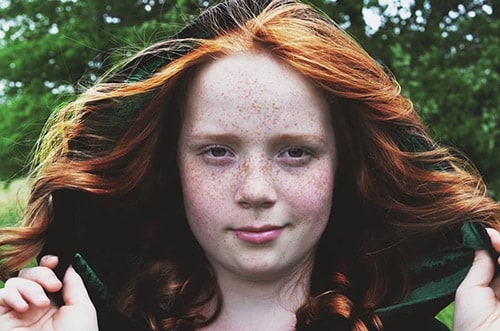Living with FASD: Brenna

Brenna, a young teen living with an FASD.
Fetal alcohol spectrum disorders (FASDs) are disabilities that last a lifetime. Children with FASDs can have behavioral, intellectual and neurological problems. FASDs can occur when a developing baby is exposed to alcohol during pregnancy.
Brenna was diagnosed with an FASD when she was 12-years-old. She and her mother, Heather, share Brenna’s story.
Brenna’s Story
Heather and her husband Jason adopted Brenna and her three siblings from foster care. Weighing just 4 pounds and 13 ounces at birth, Brenna was so small that she came home wearing a doll’s clothes.
For years, Brenna’s parents struggled to get her accurately diagnosed. She had been slow to reach many milestones as an infant and participated in early childhood services for speech and physical therapy. She was small for her age throughout elementary school. Brenna also struggled academically. She had trouble staying on task, getting easily frustrated, and having outbursts and tantrums both in school and at home.
It was also difficult for her to understand concepts such as time, money, and organization. “When Brenna was in elementary school, she preferred to play with preschoolers rather than kids her own age,” her mother, Heather, recalls. She also took everything literally. For instance, according to Heather when she said, “her classmates might be talking behind her back, Brenna had replied by saying that wasn’t true, because she would hear them.” It took Heather a bit to figure out that when Brenna said that she thought she would hear them because she took it to mean they would be right behind her back talking.
Brenna’s older sister was first of the children to be diagnosed with an FASD; Brenna was diagnosed later at the age of 12 years. Deciding if a child has an FASD takes both a physical and developmental evaluation. Since there is no biological test to diagnose FASDs, clinicians must assess a child’s exposure history, behavioral and intellectual function as well as look for neurological and physical features. Also, many other disorders have similar symptoms which must be ruled out. Among several other tests Brenna’s evaluation included an independent living/life skills test.
Benefits of a Diagnosis

At birth, Brenna weighed just 4 pounds and 13 ounces. She came home wearing a doll’s clothes.
According to Brenna’s mother, “Getting the diagnosis helped understand where Brenna was coming from.” Heather said that it helped them reframe the challenges they faced. It wasn’t that Brenna was being defiant or wouldn’t do things they asked of her, but rather that Brenna couldn’t do it or lacked the skills and ability. They had to give Brenna the space and time to do it.
Heather also commented that, “It was helpful to get the diagnosis since it made available many resources in our area, including a support group. Being part of the support group has helped us learn more about FASDs. It is a relief to know there are other children with similar issues, who, for instance, must also be reminded of personal hygiene, even though they are almost in high school.” The diagnosis also helps explain why Brenna could be disruptive in school, as the classes might be too hard for her to follow.
According to Heather, “Hearing about similar examples helped one not feel so alone. For instance, many of the children can’t find their coats, shoes, homework, or favorite toy they just had. Or how when they are done with something, they just walk away, leaving it for you to pick up, clean up, or put away. What takes typical kids weeks to master, may take your child months or even years.”
In addition to the support group, the diagnosis helped Brenna get access to local services and ensured the school system had the information they needed to best support her.
Increasing Awareness in Her Community

Brenna wearing her FASD strong T-shirt.
Brave and cheerful, Brenna has been instrumental in increasing awareness about FASDs in her school. After her diagnosis, she proudly wore her FASD T-shirt depicting a strong woman and handed out buttons and flyers about this condition. Her mother says, “I was a bit worried, wondering if she would be able to handle the comments or teasing, but Brenna did great!”
Brenna is a kind and happy teen. She loves helping people and cares about her friends and is always checking up on them. She also calls and checks on her grandmother daily.
Brenna enjoys playing the piano and being in the choir. She also recently took up junior varsity color guard and is looking forward to the competitions.

Brenna practicing junior varsity color guard.
CDC would like to give a special thanks to Brenna and her family and the National Organization on Fetal Alcohol Syndrome (NOFAS) for sharing this story with us.
CDC Activities
CDC has conducted fetal alcohol spectrum disorders (FASD) research, identification, and prevention efforts since 1991. Key activities include
- Estimating how much and how often alcohol is consumed by women of reproductive age, including pregnant women;
- Supporting the implementation, adoption, and promotion of effective interventions, including alcohol screening and brief counseling;
- Promoting effective treatments for children, adolescents, and young adults living with FASDs and their families;
- Enhancing healthcare provider education on preventing, identifying, and treating people with FASDs;
- Providing FREE online training courses on preventing, diagnosing, and caring for people with FASDs;
- Offering FASD-related educational information and materials;
- Disseminating guidelines on alcohol use, including the Dietary Guidelines for Americans; and
- Educating and informing the general public and policymakers about effective strategies for reducing excessive alcohol use, such as those recommended by the Community Preventive Services Task Force.





















.png)












No hay comentarios:
Publicar un comentario